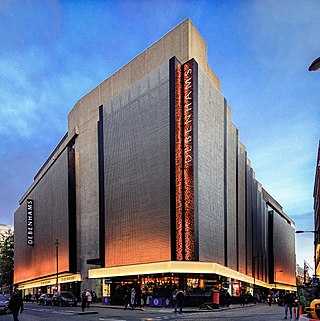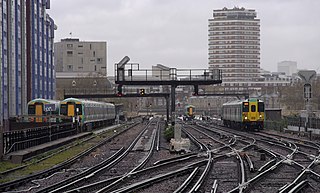
Southern is the brand name used by the Govia Thameslink Railway (GTR) train operating company on the Southern routes of the Thameslink, Southern and Great Northern franchise in England. It is a subsidiary of Govia, a joint venture between transport groups Go-Ahead and Keolis, and has operated the South Central franchise since August 2001 and the Gatwick Express service since June 2008. When the passenger rail franchise was subsumed into GTR, Southern was split from Gatwick Express and the two became separate brands, alongside the Thameslink and Great Northern brands.

Flybe, styled as flybe, was a British airline based in Exeter, England. It was sold to Connect Airways in 2019; it was the largest independent regional airline in Europe. Flybe once provided more than half of the UK domestic flights outside of London.

Debenhams plc was a British department store chain operating in the United Kingdom, Denmark and the Republic of Ireland, and is still operating as a franchise in seven Middle East countries. It was founded in 1778 as a single store in London and grew to 178 locations across those countries, also owning the Danish department store chain Magasin du Nord. In its final years, its headquarters were within the premises of its flagship store in Oxford Street, London. The range of goods sold included middle-to-high-end clothing, beauty, household items, and furniture.

Rentokil Initial is a British business services group based in Crawley, England. It was founded in 1925 as a pest-control business. It subsequently expanded and diversified, in part through growth under the leadership of Sir Clive Thompson in the 1980s and 1990s, and in part through the acquisition of BET plc in 1996, into a business delivering a wide range of facilities management services. It is listed on the London Stock Exchange and is a constituent of the FTSE 100 Index.

Great Western Railway (GWR) is a British train operating company owned by FirstGroup that provides services in the Greater Western franchise area. It manages 197 stations and its trains call at over 270. GWR operates long-distance inter-city services along the Great Western Main Line to and from the West of England and South Wales, inter-city services from London to the West Country via the Reading–Taunton line, and the Night Riviera sleeper service between London and Penzance. It provides outer-suburban services in West London; commuter services from its London terminus at London Paddington to the Thames Valley region, including parts of Berkshire and Buckinghamshire, and Oxfordshire; and regional services throughout the West of England and South Wales to the South coast of England. Great Western Railway also operates the Heathrow Express service.

British Home Stores, commonly abbreviated to BHS and latterly legally styled BHS Ltd, was a British department store chain, primarily selling clothing and household items. In its later years, the company began to expand into furniture, electronics, entertainment, convenience groceries and fragrance and beauty products.

British Electric Traction Company Limited, renamed BET plc in 1985, was a large British industrial conglomerate. It was once a constituent of the FTSE 100 Index but was acquired by Rentokil in 1996, and the merged company is now known as Rentokil Initial.
European Home Retail plc (EHR) was a listed UK company, operating in home retail. Though registered in Swindon, Wiltshire, its head office was based in Warmley, Bristol. On 13 October 2006, it was announced EHR and its subsidiary Farepak had gone into administration.

London Midland was a train operating company in England which operated the West Midlands franchise between 11 November 2007 and 10 December 2017. It was owned by the British transport group Govia.

Connaught plc was a company in the United Kingdom, operating in the social housing, public sector and compliance markets. A constituent of the FTSE 250 Index, it went into administration in October 2010.
Jonathan Paul Moulton is a British venture capitalist. He is the founder and managing partner of the private equity firm Better Capital, and is the former managing partner of the private equity firm Alchemy Partners. He is an active private investor and has been working in private equity since 1980. Moulton regularly writes, broadcasts and speaks on corporate finance and financial matters. His career has also included spells running Citicorp Venture Capital, Schroder Ventures (Permira) and the buy-out group of Apax, as well as being a director of numerous public and private companies.

Fastway Couriers is a courier delivery services company founded in Napier, New Zealand. At the peak of its service, Fastway operated delivery services in New Zealand, Australia, Ireland and South Africa. The company currently operates in Ireland and South Africa.

Greater Anglia is a British train operating company owned as a joint venture by Transport UK Group and Mitsui & Co. It operates the East Anglia franchise, providing the commuter and inter-city services from its central London terminus at London Liverpool Street to Essex, Suffolk, Norfolk and parts of Hertfordshire and Cambridgeshire, as well as many regional services throughout the East of England.

Arriva Rail North, branded as Northern by Arriva, was a train operating company in Northern England which began operating the Northern franchise on 1 April 2016 and inherited units from the previous operator Northern Rail. A subsidiary of Arriva UK Trains, Northern was the largest train franchise in the United Kingdom in terms of the size of the network and the number of weekly services run. Its trains called at 528 stations, about a quarter of all stations in the country; of these stations 476 were operated by Northern. On 1 March 2020, Arriva Rail North Limited ceased to operate and all operations were handed to HM Government's Operator of Last Resort.

Abellio ScotRail, operating services under the name ScotRail, was the national train operating company of Scotland. A subsidiary of the Netherlands-based transport conglomerate Abellio, it operated the ScotRail franchise between 1 April 2015 and 31 March 2022.

Virgin Trains East Coast (VTEC) was a train operating company in the United Kingdom that operated the InterCity East Coast franchise on the East Coast Main Line between London, Yorkshire, the North East and Scotland. It commenced operations on 1 March 2015, taking over from East Coast as a joint venture between Stagecoach (90%) and Virgin Group (10%).
Better Capital is a British Private equity firm founded by Jon Moulton in 2009.

Between 2016 and 2019, major industrial action in the form of periodic strikes and protests took place on the national railway network of the island of Great Britain in the United Kingdom. The dispute centred on the planned introduction of driver-only operation (DOO) by several train operating companies, transferring the operation of passenger train doors from the guard to the driver. Later strikes also included disputes over pay rates, planned redundancies and working hours. NI Railways operating Northern Ireland's rail network did not strike. Some of the disputes continued into early 2020, and were resolved by negotiations during the pandemic without further action. Driver-only operation was however proposed again during the 2022–2023 United Kingdom railway strikes, leading to subsequent disputes.

London North Eastern Railway (LNER) is a British train operating company. It is owned by DfT OLR Holdings for the Department for Transport (DfT). The company's name echoes that of the London and North Eastern Railway, one of the Big Four companies which operated between 1923 and 1948.
The 2022–2024 United Kingdom railway strikes were an industrial dispute between rail workers and companies, with the latter supported by the UK government. The rail workers are represented by several unions including the National Union of Rail, Maritime and Transport Workers (RMT) and the Associated Society of Locomotive Engineers and Firemen (ASLEF). The railway strikes commenced on 21 June 2022 after workers walked out over wages, planned changes to working practices – involving the removal of guards from trains, the reduction in the number of open ticket offices, and an increase in the age at which people could claim the young persons and senior citizen card – and the threat of redundancies. The industrial action was the largest in the sector since 1989, and involved 40,000 workers nationwide.
















